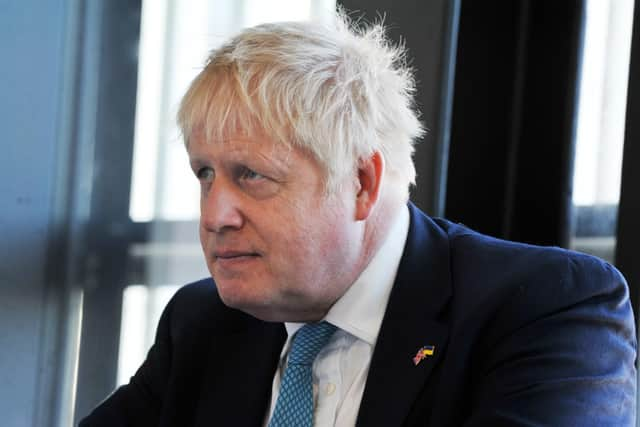Labour should prepare while Prime Minister Boris Johnson is weakened - David Blunkett
Margaret Thatcher had won her third election with a larger majority than pundits had predicted, but Labour, under Neil Kinnock, had run a sufficiently competent campaign to give some hope that Labour’s fortunes would change.
Scroll forward to April 1992. I remember walking outside, on that Friday morning, when it had become clear that John Major had won, and Neil Kinnock had announced that he was standing down as Labour leader.


Advertisement
Hide AdAdvertisement
Hide AdThe reason I recall all of this now, is because on that morning I heard a blackbird sing. I stood, in the early light, deflated and contemplating another long spell in opposition. But what really struck me was the fact that the world, certainly the natural world, just continued as though nothing had happened. People went about their lives – one day, for many, being very much the same as the last.
For here is a truth. Beyond those of us who are deeply committed and interested in politics and current affairs, another world exists. Where people’s day-to-day concerns, the challenges of how to make ends meet and their personal relationships absorbs all attention, and the goings-on in Westminster and beyond pass only spasmodically across their radar.
Remembering that truth this week is important for all of us who are still engaged in the political arena.
In my case, making the most of my birthday. Being present when my wife’s 13-month-old granddaughter took her first tentative steps. Although, of course, following the drama in Westminster as Conservative MPs gave their verdict on Boris Johnson’s premiership, at least for now.
Advertisement
Hide AdAdvertisement
Hide AdHistory teaches us that a significant challenge to a sitting Prime Minister almost inevitably leads to their imminent departure.
When 40 per cent of your own parliamentary party want rid of you, what conclusion should the electorate reach? In two weeks’ time we will have the results of the two by-elections triggered by the behaviour of two sitting Conservative MPs: one in Tiverton and Honiton, one in Wakefield, here in Yorkshire.
Taken together with the current investigation by the House of Commons All-Party Privileges Committee into whether Boris Johnson lied deliberately at the dispatch box, and Monday’s vote of “confidence” can leave the Prime Minister with no confidence at all about his future.
That is, not just his future, but the future of our country. When family and friends rang or texted to wish me happy birthday last Monday, and to suggest that I might get an unexpected birthday present, I wasn’t so sure.
Advertisement
Hide AdAdvertisement
Hide AdThey meant, of course, the defeat of Boris Johnson. Undoubtedly – from my point of view, at least – a gain for the country. However, not for my own Party’s prospects of winning the next general election – which is, after all, what oppositions are in the business of achieving.
Again, history teaches us lessons. John Major taking over from Margaret Thatcher in November 1990 drew a line under the Conservatives’ deep unpopularity, not least because of the imposition of a flat rate, local tax known as the ‘Poll Tax’. As Margaret Thatcher departed, so did her right-wing Conservative experiment, which was consigned to the dustbin of history.
Boris Johnson himself managed the clever manoeuvre of pretending that the first nine years of Conservative-led administration was absolutely nothing to do with him.
He managed, at a stroke, to make completing Brexit and the fear of a Corbyn-led government override the public’s collective memories of austerity, deteriorating public services and consequent ill-preparedness to deal with the unforeseen pandemic which would hit the world just weeks after Johnson’s general election victory.
Advertisement
Hide AdAdvertisement
Hide AdSo, it would be wise for the Labour leadership to prepare – not for having to take on Boris Johnson at the general election sometime in the next two and a half years, but rather for a fresh, if inexperienced, face at Number 10 Downing Street.
That means having a programme which manages the tight-rope walk of political statecraft; between a radical programme that offers hope and aspiration to the nation for something a great deal better, whilst at the same time not frightening the horses.
Former US President, Bill Clinton, in describing what won or lost elections, once said: “It’s the economy, stupid.” For men and women in their everyday lives, that is about inflation; the cost of heating and cooking; the threat (for that is what it is) of raised interest rates. With zero growth in the economy, productivity stalling and shortages of labour in so many parts of the business world, public expenditure will undoubtedly be squeezed, and the levelling up agenda will be somewhere beyond the back-burner.
What is sometimes described as “politics as usual”, simply won’t hack it. A successful Labour Party will need to demonstrate a very different way of engaging with the public, involving people at a point and in a way appropriate to them, in decisions about their lives and the task of rebuilding a country fit for our grandchildren. There may be some truth in the adage that it is governments that lose elections, not oppositions that win them. But is also true that their opponents not only have to be eager and ready to govern, but to play their part in taking advantage of the circumstances and giving the voters a genuine choice.
- Lord Blunkett, from Sheffield, was a key member of the New Labour government’s cabinet and is now a life peer.
